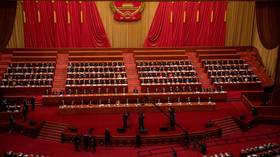As the Communist Party of China hits its centenary, those predicting its demise will find themselves waiting a long while yet

Next month the Communist Party of China (CPC) will celebrate 100 years since its foundation. Starting with its first conference in a venue in Shanghai all the way back in 1921.
Within less than 30 years, the party would assume power in a civil war and has governed the country ever since.
Despite reaching its centennial, some believe its days are numbered. Minxin Pei recently authored a Project Syndicate article saying why he believes Communist Party rule in China is facing an inevitable demise, branding it as on a trajectory to become a “North Korea” like state in the grip of absolute control and a personality cult.
Pei belongs to a school of thought concerning China known as the ‘collapsists’, who believe that the end of Communist Party rule is inevitable; a matter of when, not if. The most famous author of this school is Gordon Chang, who authored the “coming collapse of China”… in 2001. Despite being consistently proven wrong, they persist in believing that a crisis will emerge that finally forces the CPC to make that fatal ‘slip up’. Their thinking stems primarily from the ‘End of History’ thesis as advocated by Francis Fukuyama. This holds, thanks to Western hubris as a result of winning the first Cold War, the belief that the victory of ‘American values’ is inevitable and communist states are doomed to failure. Therefore, the CPC is destined to meet the same fate as the USSR.
These insights are of course ideological and absolutist. Whilst of course we have to acknowledge that nothing lasts forever, it’s nonsense to suggest communist rule in China is facing its reckoning as the party approaches its 100th birthday. Of course, it is not invincible, its rule has faced many, many crises both during and prior to its rule of China, yet this resilience is, in itself, enough to make the point that the CPC is adaptable enough to overcome every challenge history has flung its way so far. After all, why did disasters such as the Great Leap Forward or the Cultural Revolution not ruin the party? This is what is always overlooked. The CPC at its heart is not a dogmatic party rooted in ideological zealotry, but a survivalist party rooted in pragmatism and self-reflection.
To understand this, one must dive deeper into the party’s political theory and history. The CPC’s institutional culture is built on a legacy of instinctive survival against the odds. For the first three decades of its history, it existed as a guerrilla outfit facing vastly superior opponents, such as the Kuomintang (KMT) government and the Japanese. This is why the experience of what is popularly known as ‘the long march’ is important and, as such, an event widely commemorated in party rhetoric. In 1934, the KMT besieged the CPC base in Jiangxi, Southeast China, and forced a gruelling retreat by the party of nearly 6,000 miles northward. On the backdrop of this, the party’s institutional culture is built on the premise of struggle and survival.
Yet, what might be understood as ‘pragmatism’ in the party ultimately derives from Mao Zedong. Mao utilized a set of essays on what it meant to learn and acquire knowledge, titling it ‘on practice’. He argued that the truth and success of a given idea was vested in its physical application and results, a form of scientific method, if you will, rather than pure ideology. Although this did not stop Mao’s own dogmatism with respect to the Cultural Revolution, these theories were taken and reinterpreted by his successor, Deng Xiaoping, in the 1970s, placing pragmatism at the heart of party governance, as opposed to ideological rigidity. As Deng famously said, “It doesn’t matter what colour the cat is as long as it catches the mouse,” and on that premise justified the reform of China’s economy, mixing socialist ideas with market methods.
China subsequently learnt and recovered from the setbacks of the Mao era, and the party if anything strengthened its grip on power. Now of course, there might be a counterargument, that Xi Jinping is ‘moving away’ from this Dengist line of thought and repeating the mistakes of Chairman Mao. Indeed, this is a common Western accusation. The changes Xi Jinping is making do involve a growing centralization of power, but the context that often goes missing is that these events do not happen in a vacuum. They are a product of the growing hostility the West has vented towards Chinese power and a continually changing international environment. The world that Deng Xiaoping inhabited, where the US saw Beijing as a partner against the USSR, no longer exists.
Also on rt.com China moving closer to launch of world’s first sovereign digital currencyIt is, of course, an integral part of Western ideology to assume that ‘more openness’ and ‘more reform’ can only be the ‘right path’ for the CPC. Therefore, to the Western mind, it follows that should China take a path that they don’t like, it will fall. But that is far flung from Pei’s assertion that Beijing is inexorably becoming a “North Korea” like state. Not only does that assertion ignore realities of size, resources, and vulnerability, but very different sets of circumstances and history. But in any sense, if the aforementioned disasters in the 1960s did not end the party, nor the Tiananmen Square episode of 1989, why would tensions with the West now bring about its demise?
In this case, is the CPC truly doomed at its centennial? The disapproval of Xi Jinping and the country’s current course espoused by Western thinkers stems from a long-held ideological bias that assumes failure, thereby dismissing the party’s ability to stay in power and sustain popular legitimacy through its ability to adapt, look ahead, and approach challenges with resilience. Only a year ago, people were calling Covid-19 a major threat to party rule, but it didn’t end that way. In any case, those wishing for the CPC’s ‘imminent’ demise may find themselves waiting for a long time.
Think your friends would be interested? Share this story!
The statements, views and opinions expressed in this column are solely those of the author and do not necessarily represent those of RT.















